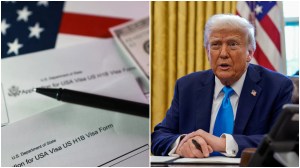Donald Trump’s return to the White House is set to bring significant changes to technology policy in the US. On Tuesday night, India time, the US President announced an ambitious $500 billion AI initiative, the Stargate project, that demonstrates a clear shift in his AI policy toward innovation over regulation. This announcement, made alongside OpenAI, Oracle, and SoftBank representatives, also received support from other major companies like Arm, Microsoft and Nvidia.
The Stargate project outlines a commitment to spend $500 billion over the next four years to develop advanced AI infrastructure primarily across the United States. An initial investment of $100 billion has already been committed. The funds will be directed towards building massive AI data centres, starting in Texas, a location Trump personally favours. Importantly, the project also promises to create over 100,000 American jobs almost immediately.
“While the Stargate project’s primary objective is to solidify the US’ leadership in the AI ecosystem, it also presents opportunities for India to leverage,” said Ashok Chandak, president, India Electronics and Semiconductor Association (IESA). Major companies supporting this initiative already have a significant presence in India and actively utilise Indian talent. “This creates avenues for Indian professionals to gain exposure and contribute to such a monumental project, enhancing their expertise in advanced AI technologies,” he added.
“Stargate epitomises everything that Trump 2.0 stands for —:a large, collaborative US initiative which celebrates the large scale technology providers like Oracle and Open AI and underlines the MAGA (Make America Great Again) vision of America being the creator and leader for all that is good and great for mankind,” said Ganesh Natarajan, chairman of 5F World and Honeywell Automation India.
According to Jaspreet Bindra, founder, AI&Beyond, the Stargate project will result in enormous computing power and necessitate the creation of energy infrastructure to power these massive data centres. It aims to attract more talent to the US and focuses on two key sectors: healthcare and national security. He remarked that this announcement marks a bold move by Donald Trump, even in the early days of his presidency, demonstrating a strong commitment to AI and signaling that the US intends to maintain and expand its leadership in AI, especially in competition with China.
Incidentally, much of this plan was already in development over the past few months. For instance, Masayoshi Son of SoftBank had previously met with Donald Trump and committed a $100 billion investment. “It appears that various smaller initiatives have been combined into this major political announcement on AI. While it remains to be seen whether the full commitment will materialise, it is undeniably a significant step. The US has effectively drawn a line in the sand, asserting its intent to lead the global AI race,” Bindra added.
Moreover, Trump’s appointment of an AI and crypto czar — former PayPal COO, David Sacks — reinforces this commitment, felt Bindra. With the support of influential tech leaders like Elon Musk and other major CEOs, Stargate is likely to catalyse substantial investments in AI beyond the $500 billion project.
“While there is no doubt that the US can and will capture leadership in this approach to AI, the world should watch out for Point AI and Application AI solutions through small language models (SLMs) from China and possibly India which could reinvent the future of AI,” Natarajan said.
“If we have to put climate change and sustainability back on the table, the world should explore nimble and cost-effective options to the Stargate approach,” he added.
As for India, there could be collateral benefits. Bindra felt that Stargate is expected to create increased demand for skilled workers, both in the US and India. However, the extent to which India benefits will depend on Trump’s immigration policies. He cautioned that this announcement may create competitive pressure, potentially prompting the Indian government and industry to focus more on AI beyond the Rs 10,000-crore IndiaAI Mission.
According to Ajai Chowdhry, founder of HCL and chairman of EPIC Foundation & MGB, National Quantum Mission of India, the Stargate initiative shows serious intent to take a strong control of AI, in addition to having all the large language models (LLMs) owned by the US. “However, we seem to be getting to weaponisation of tech. For strategic autonomy, we must create our own AI doctrine and start controlling our own data strongly. Also, we must create our own domestic hardware for data centres as it’s going to be very difficult to control our data. Government and the industry must work together to create the strategy for AI. What was thought of yesterday is no longer valid. It should be treated as an emergency,” he added.
On an optimistic note, Bindra said that collaboration opportunities may arise due to the sheer scale of the project. “Large Indian tech firms could find opportunities to partner with the US on AI initiatives. There could also be knowledge transfers that would benefit Indian industries and AI development. Thus, there are numerous ways in which India could indirectly benefit from this ambitious project,” he summarised.









